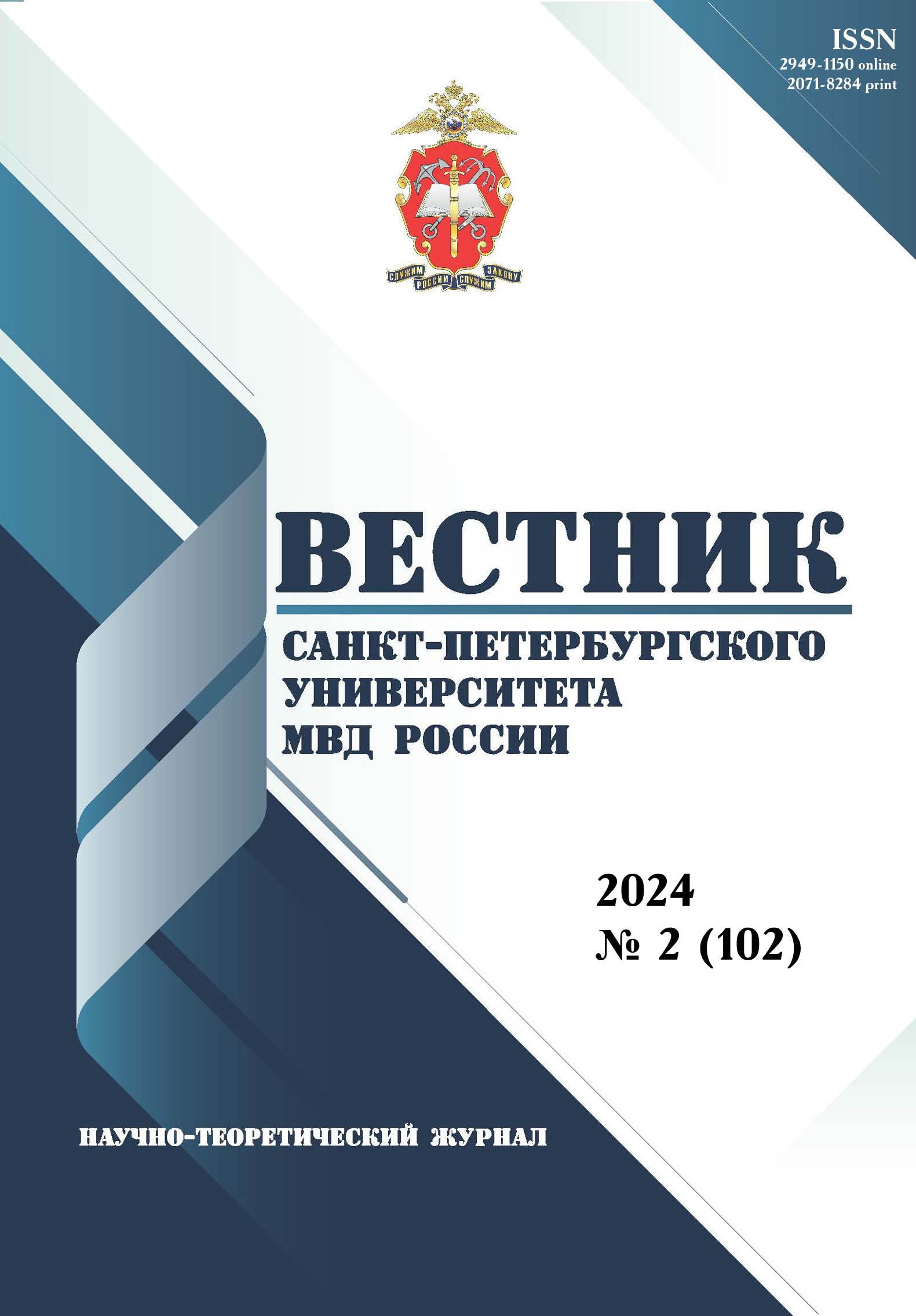St. Petersburg, St. Petersburg, Russian Federation
Saint Petersburg, St. Petersburg, Russian Federation
Saint-Petersburg, St. Petersburg, Russian Federation
UDC 159.9
Introduction. Intragroup relations in service teams, on the one hand, can increase “work tiredness” caused by the tension of activity, lead to an employee’s fatigue. But fatigue as a manifestation of the tonic state of risk affects not only the quality of solving service tasks, but also the intragroup relations in the service team. The aim of the research is to study the peculiarities of intragroup relations in the service team, their interrelation and differences among internal affairs bodies’ employees with different levels of fatigue. Research methods. The respondents were 150 employees of internal affairs bodies with service experience from 7 to 10 years. A set of the authors’ psychodiagnostic questionnaires was used: “Subjective assessment of intragroup relations” (S. V. Dukhnovsky, K. V. Zlokazov) and “Subjective assessment of personality fatigue level” (S. V. Dukhnovsky, E. K. Shelepina). Results. The authors revealed that an employee’s fatigue is interrelated with positive (emotional closeness, professional self-relationship) and negative (tension, conflict, aggressiveness, sensual tone) parameters of intragroup relations in the service team. The authors established that functional-positive parameters of intragroup relations prevail over functional-negative ones among the respondents with a moderate level of fatigue. The employees with an increased level of fatigue have functional-negative characteristics dominating over positive ones. The authors show that with increasing fatigue the subjects are less concerned about the relations in the service team. Features of intragroup relations in the service team can be risk factors for the development and strengthening of an employee’s fatigue. Assessment of the level of fatigue makes it possible to evaluate how relations in the service team are perceived from the point of view of the expression of their functional positive and negative characteristics.
service team, sensual tone of relations, emotional closeness, conflict, mental state, working capacity, fatigue, riskiness
1. Gus’kova T. A. Vliyaniye psikhologicheskoy sovmestimosti sotrudnikov na sotsial’nopsikhologicheskiy klimat v kollektive // Meditsina. Sotsiologiya. Filosofiya. Prikladnyye issledovaniya. – 2022. – № 6. – S. 93–98.
2. Isanov A. P. Upravleniye mezhlichnostnymi otnosheniyami v kollektive // Science and Education : setevoye izdaniye. – 2023. – T. 4. – № 1. – S. 747–755. – URL: https://openscience.uz/index.php/sciedu/issue/view/41.
3. Korzhev S. V. K voprosu opredeleniya struktury sotsial’nykh otnosheniy v voinskikh kollektivakh // Meditsina. Sotsiologiya. Filosofiya. Prikladnyye issledovaniya. – 2021. – № 4. – S. 63–65.
4. Zverev V. O., Maksimov A. S., Tikhonova Ye. A. Etnopsikhologiya sluzhebnykh otnosheniĭ v kollektivakh organov vnutrennikh del // Psikhopedagogika v pravookhranitel’nykh organakh. – 2019. – T. 24. – № 4 (79). – S. 369–374; https://doi.org/10.24411/1999-6241-2019-14003.
5. Naumov S. I., Savchenko S. A. Etnokul’turnyye aspekty sotsial’nogo vzaimodeystviya v pravookhranitel’noy sfere // Sovremennyye issledovaniya sotsial’nykh problem : elektronnoye izdaniye. – 2017. – T. 8. – № 9. – S. 58–81. – URL: https://rjep.ru/jour/index.php/rjep.
6. Pelevina A. A. Osobennosti «neustavnykh otnosheniy» v razlichnykh sotsial’nykh organizatsiyakh // Vestnik Yuzhno-Ural’skogo gosudarstvennogo universiteta. Seriya: psikhologiya. – 2014. – T. 7. – № 1. – S. 118–121.
7. Bodrov V. A. Professional’noye utomleniye: fundamental’nyye i prikladnyye problemy. – Moskva: Institut psikhologii RAN, 2009. – 558 s.
8. Zinchenko V. P., Leonova A. B., Strelkov Yu. K. Psikhometrika utomleniya. – Moskva: Izdatel’stvo Moskovskogo universiteta, 1977. – 109 s.
9. Kulikov L. V. Psikhologiya nastroyeniya : monografiya. – Sankt-Peterburg: Izdatel’stvo Sankt-Peterburgskogo universiteta, 1997. – 225 s.
10. Leonova A. B., Velichkovskaya S. B. Differentsial’naya diagnostika sostoyaniy snizhennoy rabotosposobnosti / Psikhologiya psikhicheskikh sostoyaniy : 200-letiyu Kazanskogo universiteta posvyashchayetsya : sbornik statey / nauch. red. A. O. Prokhorov. – Kazan’: Tsentr innovatsionnykh tekhnologiy, 2002. – S. 326–343.
11. Maslova N. B., Bloshchinskiy I. A., Maksimenko V. N. Neyrofiziologicheskaya kartina geneza utomleniya, khronicheskogo utomleniya i pereutomleniya cheloveka-operatora // Fiziologiya cheloveka. – 2003. – T. 29. – № 5. – S. 123–133.
12. Velichkovskiy B. B. Kognitivnyye effekty umstvennogo utomleniya // Vestnik Moskovskogo universiteta. Seriya 14. Psikhologiya. – 2019. – № 1. – S. 108–122; https://doi.org/10.11621/vsp.2019.01.108.
13. Zakharov V. V., Yakhno N. N. Narusheniya pamyati. – Moskva: GEOTAR-MED, 2003. – 160 s.
14. Luriya A. R. Osnovy neyropsikhologii. – Sankt-Peterburg: Piter, 2023. – 384 s.
15. Ogorodnikova L. A. Podkhody k issledovaniyu pamyati v otechestvennoy i zarubezhnoy psikhologii // Yaroslavskiy pedagogicheskiy vestnik. – 2012. – T. 2. – № 2. – S. 308–312.
16. Rubinshteyn S. Ya. Eksperimental’nyye metodiki patopsikhologii i opyt primeneniya ikh v klinike : v 2 kn. – Moskva: Izdatel’stvo Instituta psikhoterapii, 2009. – Kn. 1. – 224 s.
17. Ushakov V. O. Issledovaniye dinamiki funktsionirovaniya mekhanizmov mnemicheskikh sposobnostey pri uslozhnenii mnemicheskoy zadachi // Psikhologiya. Zhurnal Vysshey shkoly ekonomiki. – 2014. – T. 11. – № 3. – S. 149–163.
18. Cheremoshkina L. V., Osinina T. N. Pamyat’: zakonomernosti vosproizvedeniya uchebnogo materiala : monografiya. – 2-ye izd., pererab. i dop. – Moskva: Yuraĭt, 2019. – 235 s.
19. Dukhnovskiy S. V., Zlokazov K. V. Sub”yektivnaya otsenka vnutrigruppovykh otnosheniy: opisaniye oprosnika i vozmozhnosti yego ispol’zovaniya // Vestnik Kaliningradskogo filiala Sankt-Peterburgskogo universiteta MVD Rossii. – 2023. – № 4 (74). – S. 106–112.















